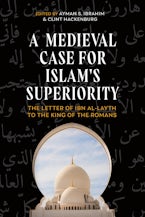In the last decade of the eighth century, the longtime caliphal secretary, Ibn al-Layth (d. ca. 819), composed a letter on behalf of the caliph Hārūn al-Rashīd (r. 786-809) to the Byzantine emperor Constantine VI (r. 780-797). This letter is now widely considered to be the oldest surviving apologetic defense of Islam and polemic against Christianity. Ibn al-Layth’s apology for Islam is representative of other early apologies and includes a sustained effort to defend Muhammad’s character and prophetic office, the oneness of God, and the inimitability of the Qur’ān. Ibn al-Layth uses natural phenomena, reason, miracles, and a variety of biblical proof texts to justify his positions.
Unsurprisingly, in his polemical attacks on Christianity Ibn al-Layth challenges the Trinity as well as the divinity of Jesus. What makes Ibn al-Layth’s work unique, however, is his use of the Old and New Testaments, which he utilizes in order to undermine Christian beliefs, defend God’s absolute oneness, and claim that the Bible predicts the coming of Muḥammad. For these reasons, Ibn al-Layth’s letter is of inestimable importance to the study of early Islamic history and theology and Christian-Muslim relations.
A Medieval Case for Islam’s Superiority makes Ibn al-Layth’s letter accessible to a broader audience for the first time. Ayman S. Ibrahim and Clint Hackenburg provide an improved critical edition of the Arabic text that consults all six known manuscripts, its first complete English translation, and a comprehensive introduction to Ibn al-Layth’s life and work. The book also demonstrates how Ibn al-Layth’s letter has been used by later Muslim thinkers in their arguments for the superiority of Islam over Christianity, marking the significance of the letter in the study of the historical relationship between Islam and Christianity.

